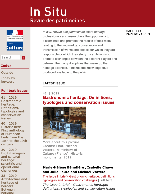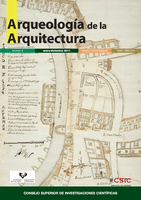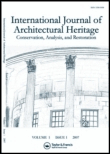
In Situ-Revue de Patrimoines
Scope & Guideline
Fostering dialogue in the world of heritage conservation.
Introduction
Aims and Scopes
- Performing Arts Heritage:
The journal emphasizes the preservation and analysis of theatrical heritage, including the restoration of historical theaters, costumes, and archival materials related to the performing arts. - Fashion and Clothing Heritage:
It explores the historical significance of clothing and fashion, addressing the conservation of textile collections, fashion heritage, and the cultural narratives surrounding clothing. - Architectural Heritage:
The journal covers the restoration and conservation of architectural sites, focusing on both historical buildings and modern architecture, emphasizing their cultural and historical significance. - Cultural Memory and Documentation:
It emphasizes the importance of archives and documentation in preserving cultural memory, analyzing how historical narratives are constructed and maintained. - Interdisciplinary Approaches to Heritage:
The journal employs interdisciplinary methodologies, integrating perspectives from various fields such as history, sociology, and art history to provide a comprehensive understanding of heritage.
Trending and Emerging
- Digital Heritage and Technology:
There is a growing emphasis on the role of digital technologies in heritage preservation, including the use of digital archives and virtual reconstructions, reflecting the increasing importance of technology in cultural heritage. - Women's Contributions to Heritage:
The journal is increasingly focused on highlighting women's roles and contributions to cultural heritage, addressing previously overlooked narratives and promoting gender inclusivity in heritage discussions. - Contemporary Cultural Heritage:
Emerging themes include the exploration of contemporary cultural practices and their implications for heritage, indicating a shift towards understanding heritage in the context of modern societal changes. - Environmental Sustainability in Heritage Preservation:
There is a notable trend towards discussing the environmental aspects of heritage conservation, including sustainable practices in restoration and the impact of climate change on heritage sites. - Interdisciplinary Collaborations:
An increase in interdisciplinary research collaborations is evident, as scholars from various fields come together to address complex heritage issues, reflecting a more holistic approach to heritage studies.
Declining or Waning
- Industrial Heritage:
Previously a prominent theme, the focus on industrial heritage appears to be waning, with fewer papers discussing the preservation and significance of industrial sites and practices. - Legal and Administrative Aspects of Heritage:
There seems to be a decline in articles specifically addressing the legal frameworks and administrative challenges surrounding heritage preservation, indicating a potential shift towards more practical and hands-on approaches. - Historical Clothing Practices:
The exploration of historical clothing practices and their socio-cultural implications seems to be less frequent, suggesting a possible shift in focus towards contemporary fashion issues. - Local Heritage Initiatives:
There is a noticeable decrease in the discussion of local heritage projects and community-led initiatives, which may reflect a broader trend toward focusing on national or international heritage narratives. - Hygiene and Public Health Heritage:
Themes related to hygiene and public health heritage, which were previously explored, appear to be receiving less attention, possibly due to a broader focus on more traditional forms of heritage.
Similar Journals

Journal of Historic Buildings and Places
Preserving the Past, Inspiring the Future.The Journal of Historic Buildings and Places, published by the esteemed Ancient Monuments Society, is a pivotal platform dedicated to advancing the study and preservation of historic architecture and cultural heritage. With an ISSN of 2753-2453, this journal serves as a sanctuary for researchers, professionals, and students who are passionate about exploring the significance of historic buildings, landscapes, and places. Its commitment to open access publication ensures that critical findings in the field are readily available to a global audience, thus facilitating wider dissemination of knowledge and fostering collaborative engagements among scholars. The journal contributes significantly to the ongoing discourse on conservation practices, architectural history, and heritage management, making it an essential resource for anyone committed to the study and preservation of our architectural legacy.

Arqueologia de la Arquitectura
Innovative Insights into Architectural ConservationArqueologia de la Arquitectura is a premier scholarly journal published by CONSEJO SUPERIOR INVESTIGACIONES CIENTIFICAS-CSIC, specializing in the intricate intersections of architecture, archaeology, and conservation. Since its inception in 2002, this Open Access journal has provided researchers, professionals, and students with a platform to share innovative findings that deepen our understanding of architectural heritage and its archaeological contexts. Based in Spain, it has demonstrated remarkable academic rigor and impact, achieving Q1 rankings in multiple categories, including Architecture and Visual Arts and Performing Arts, alongside a Q2 in Archaeology as of 2023. With a robust presence in Scopus, ranking within the 88th percentile for Visual Arts and Performing Arts, Arqueologia de la Arquitectura stands as a crucial resource for those dedicated to the preservation and study of our built heritage, encouraging interdisciplinary dialogue and research advancements in these elegant fields of study.

Zograf
Fostering academic excellence in the heart of Serbia.Zograf is a distinguished open-access journal published by the University of Belgrade's Institute of Art History, Faculty of Philosophy, dedicated to the fields of Archeology, History, and Visual Arts and Performing Arts. With an ISSN of 0350-1361 and an E-ISSN of 2406-0755, Zograf has made substantial contributions to research within its domain since transitioning to open access in 2002. Situated in Serbia, the journal has achieved notable recognition, ranking in the Q1 category for both History and Visual Arts and Performing Arts, and in the Q2 category for Archeology in the recent 2023 evaluations. This positioning underscores its significance and influence among peers, making it an invaluable resource for researchers, academics, and students alike. The journal's commitment to disseminating high-quality scholarship facilitates interdisciplinary dialogue and advances knowledge in the humanities, while its open-access model ensures that research is freely available to a global audience. Zograf's editorial board comprises leading scholars who are dedicated to promoting innovative research that inspires future generations of scholars.

TRANSACTIONS OF THE ANCIENT MONUMENTS SOCIETY
Preserving the Past, Inspiring the FutureTRANSACTIONS OF THE ANCIENT MONUMENTS SOCIETY is a distinguished journal published by the Ancient Monuments Society in the United Kingdom, focusing on the rich interplay between architecture, conservation, and religious studies as they pertain to ancient monuments and heritage. With an ISSN of 0951-001X, this journal serves as an essential platform for researchers, professionals, and students interested in exploring methodologies, case studies, and theoretical perspectives that enhance our understanding of historical preservation and cultural significance. Although it has been classified in Q4 quartiles in prominent categories such as Architecture, Conservation, and Religious Studies, the journal plays a vital role in fostering scholarly dialogue in these areas. Access options and updates are available, making it easier for enthusiasts and experts alike to engage with ongoing discussions surrounding ancient monuments. Despite its discontinued coverage in Scopus, the journal remains an invaluable resource for those aiming to contribute to the conservation discourse and to understand the relevance of ancient sites in contemporary society.

Rijksmuseum Bulletin
Connecting Researchers and Art Enthusiasts GloballyThe Rijksmuseum Bulletin, published by the Rijksmuseum Amsterdam, stands as a premier open-access journal in the realm of Visual Arts and Performing Arts, having transitioned to open access in 2012. With its ISSN 1877-8127, the journal is dedicated to exploring the rich tapestry of art history, exhibitions, and cultural discourse, supporting both scholarly research and the general appreciation of the arts. As a significant contributor within the Netherlands and beyond, the Bulletin garners a solid reputation, reflected in its current ranking in the Q3 category of Visual Arts and Performing Arts, with a Scopus rank of #510 out of 667. This engaging platform not only disseminates high-quality research but also fosters collaboration among researchers, professionals, and students, providing insights that highlight the importance of cultural heritage. With converged years spanning from 2011 to 2024, the Rijksmuseum Bulletin is poised to remain a vital source of knowledge within the arts community.

International Journal of Architectural Heritage
Advancing Knowledge in Heritage and Design.The International Journal of Architectural Heritage is a premier publication dedicated to the multidisciplinary fields of architecture, conservation, and visual arts. Published by TAYLOR & FRANCIS INC, this journal serves as a vital platform for scholars and practitioners who aim to advance knowledge in the preservation of cultural heritage and architectural innovation. With an impressive impact factor reflecting its critical acclaim, including rankings in the top quartile (Q1) across multiple categories in 2023, the journal is recognized as a key resource in Arts and Humanities, particularly in Visual Arts and Performing Arts and Conservation. Since its inception in 2007, the journal has consistently provided rigorous peer-reviewed research, offering enriching insights and fostering collaborations amongst students, researchers, and professionals committed to the future of architectural heritage. As it continues to influence the field through its diverse and impactful contributions, readers can expect to engage with leading-edge studies that not only illuminate current trends but also inspire innovative practices in safeguarding architectural legacies.

Bulletin KNOB
Exploring Cultural Narratives Through TimeBulletin KNOB, published by the KONINKLIJKE NEDERLANDSE OUDHEIDKUNDIGE BOND-KNOB, is a reputable Open Access journal that has been disseminating knowledge since 1899, with a continued commitment to making research accessible to all. Based in the Netherlands, this journal provides a platform for scholarly articles that span the fields of Conservation, History, and the Visual Arts and Performing Arts. With its 2023 Scopus rankings placing it in the top quartiles within its category, Bulletin KNOB is recognized for its significant contribution to the advancement of these disciplines. Researchers, professionals, and students alike are encouraged to engage with the journal's diverse content that bridges historical narratives with contemporary practices, fostering a deeper understanding of cultural heritage. The journal’s commitment to excellence is further reflected in its Q3 and Q4 quartile rankings, making it an essential resource for anyone dedicated to the study of the arts and humanities.

e-rph-Revista electronica de Patrimonio Historico
Fostering Collaboration in Cultural Preservatione-rph-Revista electronica de Patrimonio Historico is a prominent open-access journal published by UNIV GRANADA, dedicated to the study and dissemination of research focused on historical heritage and preservation. Since its inception in 2007, this journal has become an essential platform for scholars, researchers, and practitioners in the field, offering a wealth of peer-reviewed articles that contribute to the understanding of cultural heritage's significance in our society. With its ISSN 1988-7213 and a commitment to open-access dissemination, e-rph ensures that rigorous academic research is accessible to a global audience, thereby fostering knowledge exchange and collaboration among professionals and students alike. As the preservation of historical patrimony becomes increasingly vital in a rapidly changing world, this journal stands at the forefront of scholarship, inviting contributions that explore innovative solutions and perspectives on heritage conservation.

Architektura & Urbanizmus
Empowering Voices in Architecture and Urban ConservationArchitektura & Urbanizmus is a distinguished scholarly journal published by the Institute of History at the Slovak Academy of Sciences, with a specific focus on the fields of architecture, conservation, and urban studies. Since its transition to Open Access in 2021, the journal aims to broaden the accessibility of vital research findings to a global audience, fostering knowledge-sharing and collaboration among scholars, practitioners, and students alike. The journal has consistently contributed to the academic discourse since its inception and now spans converged years from 2007 to 2023, adapting to the evolving landscape of its disciplines. With its categorization in Q3 for both Architecture and Conservation, and Q4 in Urban Studies for 2023, it stands as a credible platform for disseminating innovative research and practical insights. The journal's current Scopus rankings reflect its growing influence in the field, offering a significant opportunity for researchers to contribute original work that addresses contemporary challenges in architecture and urban development. Situated in the heart of Bratislava, Slovakia, at Klemensova 19, Architektura & Urbanizmus invites contributions that enrich the architectural heritage and environmental integrity of urban spaces.

Revista Eletronica Ventilando Acervos
Exploring the Frontiers of Archival ScienceRevista Eletronica Ventilando Acervos, with ISSN 2318-6062, is a pioneering academic journal published by the esteemed MUSEU VICTOR MEIRELLES-IBRAM, dedicated to the exploration and dissemination of research in the field of archival studies, museum studies, and heritage conservation. As an open-access journal, it provides unrestricted access to a wealth of scholarly articles, promoting the sharing of knowledge and innovative practices among researchers, professionals, and students alike. Situated in Florianópolis, Brazil, the journal not only showcases local research but also contributes to global discourse on cultural heritage and information management. With a vision to foster collaboration and dialogue within the academic community, Revista Eletronica Ventilando Acervos plays a pivotal role in enriching our understanding of archival science and its impact on society, making it an invaluable resource for anyone engaged in this dynamic field.